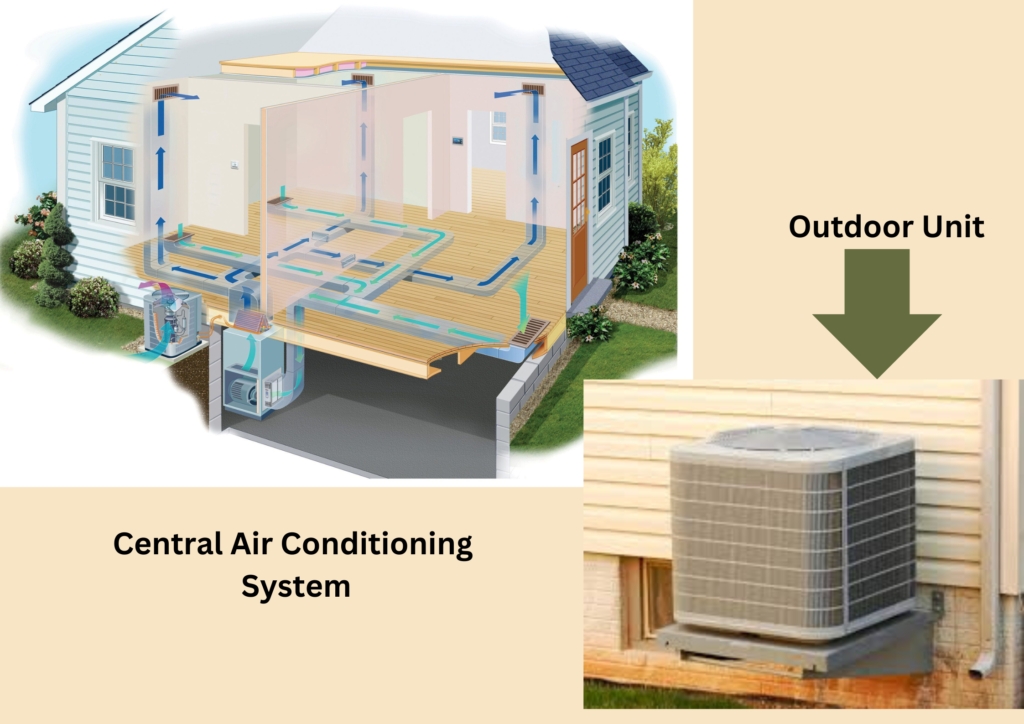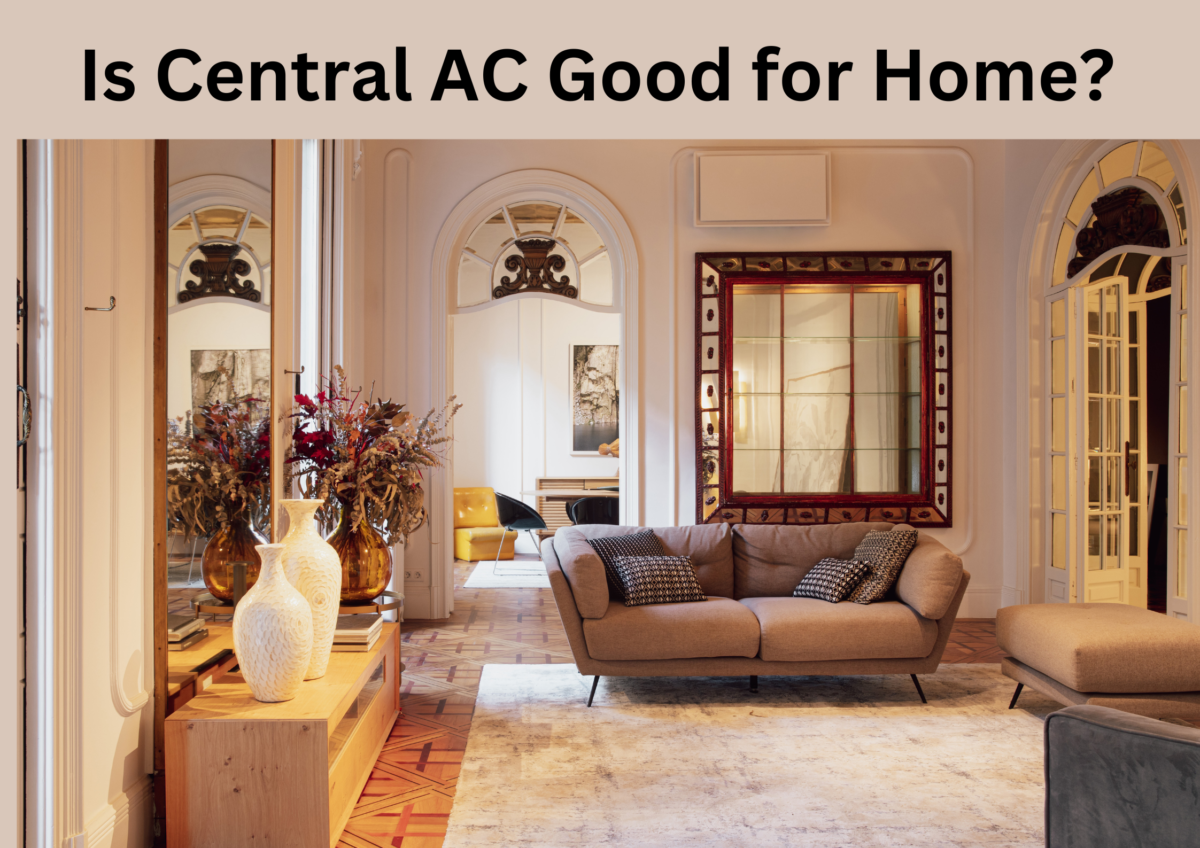Do you want to invest in cooling your whole house? But you are confused about “Is central AC good for home?”. So, before purchasing a central AC for your home, you must read this article to know its benefits, side effects, installation cost, etc.
Yes, a central AC is good for your home. It maintains the indoor temperature of your home, keeps it cool, and circulates cool and purified air throughout your home.
This article explains in detail the various components of a central AC system, its benefits, challenges to face during installation of the system, and a brief idea of installation cost.
What Is Central AC?
A central air conditioner or, central AC is a system that cools the air at a central location and circulates the cool air to multiple rooms through fans and ductwork. Central AC is an ideal system to cool large spaces.
The air conditioner compressor plays a key role in the whole process of air conditioning process. The refrigerant gas present inside the compressor absorbs the heat inside the house and discharges it outside to make the indoor air cool and comfortable.
There are mainly two types of central air conditioners split system and other is packaged unit. The split system central air conditioner consists of two units i.e. indoor and outdoor units. The condenser and compressor are placed in the outdoor cabinet and the evaporator coil is placed inside the indoor cabinet.
Whereas, in packaged central AC, the compressor, condenser, and evaporator coil are all placed in a single cabinet which is located on a roof or, outside the home.

Components of a Central AC System
Condenser: The condenser works like a heat exchanger. The refrigerant gas absorbs heat from inside the house and moves through the condenser coils to dissipate the heat outside. Inside these coils, the condensation process starts which converts the refrigerant gas into liquid.
Compressor: It is the real workhouse of the whole system. It increases the pressure and temperature of low-pressure cool refrigerant vapor into high-pressure hot gas.
Evaporator: The liquid refrigerant from the condenser enters into the evaporator coils. When the cool refrigerant travels through the evaporator coil, it absorbs the heat from the air passing through the coil. This heat absorption converts the refrigerant from cold mist to warm vapor.
Expansion Valve: These are small control valves that are located in the line carrying refrigerant to the evaporator coil. This valve lowers the pressure on this liquid refrigerant as it passes into the evaporator. In this process, the refrigerant absorbs a considerable amount of heat from the surroundings and converts it into a gas.
Benefits of Central AC
Enhanced Comfort:
A central AC system provides consistent cool air throughout the house all day and night. Even in hot summer days, you find your home at a comfortable temperature.
Quick Cooling:
With a Windows AC system, you must wait hours to get the entire home cooled. The central AC works more efficiently and keeps the temperature inside the home at the desired level all day and all night. This system provides a cool house whenever you need it.
Better Air Quality:
In the central AC system, the cooled air first passes through air filters before getting distributed inside the home through air ducts. The air filter is integrated with some filtration technique that extracts airborne pollutants, dust mites, and other allergens from the air. This improves the quality of the indoor air.
Reduces Noise:
In the central AC system, the condenser unit, which produces noise, is placed outside the house. Thus, these systems create a quieter and more comfortable environment than the Windows AC system.
Maintains the humidity Level:
This system removes moisture from the air inside the home and thus, helps in getting rid of mold and mildew from the home.
Improves Health Quality:
The central AC system circulates clean and healthy air inside the home. This helps in improving sleep quality, avoids asthma attacks, and provides good mental health to people living inside the house.
Improved Aesthetics:
The system components and equipment of a central AC system are placed out of view. The air handling unit is usually placed in the basement area and the ductwork is present behind the closet. This gives a clean look and improves the appearance of the home.
Greater Lifespan:
The central AC system can last for decades. It runs smoothly for years with regular maintenance.
Health Benefits of Central AC

Maintains Humidity:
A central AC system extracts excess moisture from the air and maintains the humidity level of the indoor air. Thus, the system saves you from heat exhaustion, fainting, dehydration, etc. Excess moisture inside the home causes mold growth and excessive dust mites. Thus, the installation of a central AC maintains the ideal humidity level and keeps you healthy.
Improves Respiratory Health:
Airborne particles, fumes, harmful gases, etc. are trapped inside closed homes and offices and cause severe respiratory diseases like asthma and allergic symptoms. Installation of a central AC captures these airborne particles, and dust in the air filters and circulates clean and healthy air inside the home. Thus, it helps improve the respiratory health of people living inside the home.
Offers Constant Temperature:
A central AC system maintains a constant temperature inside a home. This helps your body from getting less infected by bacterial and virus infections.
Improves Sleep Quality:
If the room is too hot or, too cold your body finds difficulty maintaining its own temperature and this causes sleep deprivation. The central AC system maintains a constant temperature level that is not too hot or, too cold so that the body does not have to regulate its own temperature. This improves your sleep quality and makes you feel energetic and productive throughout the day.
Decreases Work Stress:
A well-maintained temperature inside a home provides you with an energetic and productive environment to work. A good work environment will keep you more focused and reduce work stress.
Challenges of Central AC Installation
- Wrong Size of Central Air Conditioning System:
You will face various problems including energy efficiency issues, high electricity bills, shorter lifespan, etc. if you install the wrong size of central air conditioning system.
Before purchasing a central AC system first calculate the BTUs (British Thermal Units) value of your home and buy accordingly. The BTU value depends on various factors including the square footage size of your home, insulation type, number of doors and windows, etc.
- Incorrect Placement of Thermostat:
If the thermostat is placed in the incorrect place especially under the sunlight it triggers temperature inaccuracies. Thus, the incorrect placement of the thermostat causes the air conditioning system to produce the wrong temperature inside the home.
- Incorrect Placement of AC Units:
The AC unit should be positioned in the right place. The wrong placement causes energy efficiency and functionality issues. It must be placed under a shaded area. However, the AC vents must be placed in open areas for proper functioning.
- Improper Insulation of Refrigerant Lines:
The refrigerant line contains the liquid-gas refrigerant which is a crucial part of the central AC system. As the refrigerant line is exposed to other elements, it must be properly insulated.
- Not Designing the Ductwork Correctly:
If the ductwork of the central AC system is not designed properly it causes functionality issues, humidity problems, noise issues, air leaks, etc. Design the air distribution system according to the capacity of your system, with high-quality materials, and by taking the help of professionals.
- Wrong Installation
Installation of a central AC system by a person without having knowledge and experience may cause various issues in the future. So, always take suggestions and help from professionals while installing a central AC system.
Environmental Impact of Central AC
Installation of an air purifier keeps your indoor air cool and comfortable. On the other hand, it consumes a huge amount of electrical energy and emits greenhouse gases which are very harmful to the environment. The emission of greenhouse gases is a primary reason behind the climate change.
According to the Department of Energy, almost 117 million metric tons of carbon dioxide are emitted into the environment per year. The central AC system consumes approximately 10% of electricity worldwide.
The refrigerants and hydrofluorocarbons used in central AC pollute the environment and are considered ozone-depleting substances.
Cost Consideration of Central AC Installation
| Central Air Conditioner Size | BTUs | Installation Cost (Approximate Values) |
| 1.5 Tons | 18000 BTUs | $3000 |
| 2 Tons | 24000 BTUs | $3400 |
| 2.5 Tons | 30000 BTUs | $3700 |
| 3 Tons | 36000 BTUs | $4200 |
| 3.5 Tons | 42000 BTUs | $4500 |
| 4 Tons | 48000 BTUs | $5000 |
| 5 Tons | 60000 BTUs | $6000 |
Conclusion
A central AC is a good option for your home if you want to keep the whole house cool and comfortable. It offers quick cooling, improves the indoor air quality, and maintains the ideal humidity level of the indoor air. It also improves the appearance of the home and provides several health benefits to users. The only disadvantage of the installation of a central AC system is its harmful effect on the environment.
FAQS
- Is central AC better than wall units?
Yes, central AC is better than wall units. The only thing to consider is you must have the space to install it. The installation of a central AC In addition to providing a cool and comfortable environment the central AC enhances the appearance of the home and also offers clean and purified air to breathe. The central AC is more energy efficient than the wall units.
2. Is Central AC a good investment?
Yes, central AC is a good investment. In addition to providing you with a cool and comfortable environment to live it also increases the property value. A house with a central AC system is costlier than an ordinary house.
Also Read
- Why Are HVAC Systems So Expensive? 10 Most Common Reasons
- What Size of HVAC System Do I Need? 2024
- What Is the Most Efficient HVAC System and Why? 2024
- Types of HVAC Systems in Apartments 2024
- HVAC System Working Principle
- HVAC System Vs Air Conditioning System: 6 Major Differences
- What Are the Most Common Types of HVAC Systems? 2024
- 6 Types of HVAC Systems for Homes 2024
- How Does a Refrigerator Work? A Step-by-Step Guide 2024
- 8 Reasons Why Refrigerator Not Cooling and Solutions
- Side By Side Vs French Door Refrigerator 2024
- Counter Depth Refrigerator vs. Standard Refrigerator: Which One Is Better?
- Where Should I Place My Air Purifier? 2024
- How Do You Know If You Need an Air Purifier? 2024
- HEPA Air Purifier: Definition, Types, Uses, Efficiency, Working Principle
- Whole House Air Purifier: Types, Pros, Cons, Working Principle 2024
- Air Purifier Advantages and Disadvantages
- How Do Air Purifiers Help? 6 Benefits
- Whole House Dehumidifier: Types, Working Principle, Pros, Cons 2024
- How Does a Commercial Dehumidifier Work? 2024
- How Does a Dehumidifier Work? Types, Uses, Benefits 2024
- 10 Tips for Buying a Dehumidifier
- Dehumidifier Vs Air Purifier 2024
- Dehumidifier vs. Air Conditioner 2024
- Cool Mist Humidifier: Types, Uses, Benefits, Working Principle 2024


7 thoughts on “Is Central AC Good for Home? 2025”